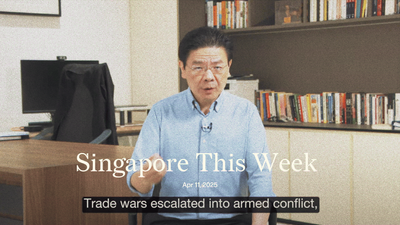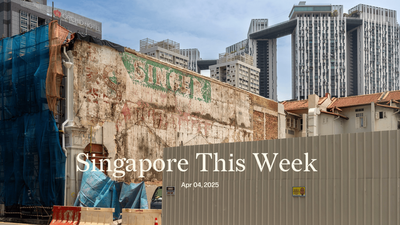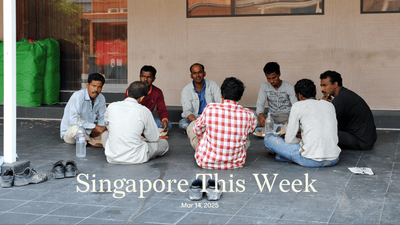Politics: Keppel’s shareholders, including all Singaporeans, are the only losers
The six executives involved in the massive Keppel Offshore & Marine Ltd (KOM) bribery scheme in Brazil were let off only with “stern warnings” because of seemingly comical circumstances, including that the person who entered into a plea bargain with the US’s Department of Justice flip-flopped when interviewed by Singapore’s Corrupt Practices Investigation Bureau. “...he denied knowing that commissions paid to the agent in Brazil were paid out as bribes,” Indranee Rajah, a minister with the ruling People’s Action Party (PAP), said in Parliament this week. How convenient. Writing in The FCPA Blog, an American publication popular in the global anti-bribery community, Lee Hsien Yang, younger son of Lee Kuan Yew, said: “This failure to prosecute, when the facts are admitted and glaring, calls into question Singapore’s commitment to its avowed zero tolerance to corruption.” Mak Yuen Teen, professor of practice at the National University of Singapore (NUS) and a corporate governance advocate, had told The Straits Times in 2018 that there may be a “deeper corporate culture issue that spans many years”, noting a 1997 case where Keppel Shipyard, now part of KOM, was fined S$300,000 after admitting to paying S$8.53m in bribes to get foreign business. Indranee claims that the government “doesn’t run these private companies that operate abroad”, and that ethical practices are “a matter for the company’s own corporate governance”. The government may not run them, but it owns them. KOM’s biggest shareholder is Temasek; and Temasek’s sole shareholder is the Ministry of Finance. Was Temasek aware of Keppel’s alleged “deeper corporate culture issue”? It is the responsibility of shareholders to hold a board accountable. Shareholders can remove directors, causing the individual significant reputational damage, or even sue directors for breach of duties. Then again, it must be difficult for Ho Ching, while boss at Temasek, and Lawrence Wong, minister of finance, to initiate a lawsuit against Lee Boon Yang, chairman of the Keppel Board (2009-2021), former PAP minister, and their party elder.
Politics: Call a spade a spade
Given that PAP politicians have long floated effortlessly above the conflicts of interest that hobble lesser mortals, it’s no surprise that Tin Pei Ling, their young angel, believes she can too. Tin’s appointment by Grab, the ride-sharing giant, as its new director of public affairs and policy, is arguably its most high profile and contentious one. Tin will be responsible for managing Grab’s government relations, something that conflicts with her responsibility as a parliamentarian—through which she has access to both ministers and civil servants—to promote overall societal well-being. Worryingly, Tin is also chairman of the Government Parliamentary Committee for Communications and Information. Gojek and other competitors must now be prowling for their own politician to anoint. Meanwhile, those overworked Grab riders in her MacPherson district might find her increasingly tin-eared. There is a related, broader issue around the need for politicians in this era to reel in Big Tech. Imagine if Elon Musk’s right-hand person at Twitter was a US congressperson. The very reason tech firms created public affairs positions is because of the naturally opposing instincts between start-ups urged to “move fast and break things” and politicians and regulators concerned about competition, trust, safety and other issues. By joining Grab, Tin blurs the lines between these competing power centres, and makes politicians and government more vulnerable to capture by Big Tech.
Note: A few hours after Jom published this, Grab announced that, following the week-long public outcry, Tin would instead join the firm in a corporate development role. The PAP, separately, announced that this past week, it has only just realised that Tin, as director of public affairs and policy, “…would be expected to engage regularly with government ministries and agencies on public policy issues on behalf of Grab.” How perceptive.
Society: Above the law?
The Singapore police apprehended and jailed Mah Kiat Seng under the pretence that he was mentally unwell, after a woman claimed he had touched her son’s head. Officers seemingly falsified evidence (that he was mumbling to himself and spat into a plastic bag) to buttress their case. A doctor who examined Mah also, two months after seeing him, wrote a report that included apparent false evidence and omitted crucial details, such as Mah’s complaint of abdomen pain after alleging that he was assaulted by the cops—all apparently to justify the police’s arrest. For all this and more, the High Court awarded Mah, who was detained for under a day, S$20,000 in damages. All well and good, justice served. But, astonishingly, the Ministry of Home Affairs (MHA) and the Attorney-General’s Chambers (AGC) may challenge the verdict. K Shanmugam, minister for home affairs and law, appears concerned that any unfair critique of police actions could undermine public trust in the force and lead to defensive policing. “They will fear that everything they do will be over-analysed and picked apart unfairly,” he explained. “It would be easier…to not do anything.” Police officers, he argued, must be empowered to make split-second decisions with limited information in high-stress situations. The Mental Health (Care and Treatment) Act allows for a police officer to detain persons with or suspected of mental health conditions, who may be dangerous to self or others. It also protects the officer from liability to civil or criminal proceedings, “unless the person has acted in bad faith or without reasonable care.” Critics have questioned the law’s unintended consequences of traumatising and causing psychological harm to the person who may or may not have a mental health condition. By effectively showing support for the errant officer, Shanmugam and the AGC may in fact embolden other potential tyrants in the force and community. Beware of anybody who says you’re mentally ill.
Society: Say ‘yes’ to less waste by wasting more
As part of its “Say Yes to Waste Less” campaign, the National Environment Agency (NEA) set up a coffee booth called “The Waste Café” in Paya Lebar Quarter in January. The café offered free coffees to passers-by on the condition that they dispose of their used paper and plastic cups in large, transparent installations. In a few hours, the “walls” of the café filled up with used cups, apparently shocking viewers into realising our collective daily wastage. NEA claims that the successful “social experiment” encouraged the public to “[confront] the reality of [their] daily lifestyle habits [and] prompt them to be more conscious about reducing their use of disposables.” Lawrence Loh, director of the Centre for Governance and Sustainability at NUS Business School, concurred, saying that “shock therapies actually induce the intended result more effectively, particularly over a longer time.” But local environmentalists disagree. Why raise awareness about the hazardous consequences of waste by wasting more? Woo Qiyun, an environmental advocate who runs the Instagram page @theweirdandwild, said that other installations have achieved the same goal by using existing waste. For example, “Plastikphobia”, a 2019 art installation created by Benjamin Von Wong and Laura Francois, used 18,000 disposable plastic cups collected from 26 hawker centres. Singapore’s overall waste generation rose by 18 percent last year (the first increase after four years of a Covid-era decline). Instead of adding to that, perhaps NEA should have “consulted with green groups to understand the risks of such a campaign.” One can accomplish “shock therapy” without generating unnecessary waste.
Arts: 29Rooms with a view
What would an art museum look like if it was designed to be the perfect companion to commerce? The new 29Rooms pop-up at Gardens by the Bay might come very close to answering that question. According to Piera Gelardi, co-founder of Refinery29 (the group behind it), 29Rooms is “a way for brands to connect with people in real life”, one that allows people to “see brands in a new light”. North American editions have featured installations by celebrities like Lizzo and Kesha. Audiences for the Singapore edition can expect the launch of singer Billie Eilish’s second perfume (Eilish No. 2), Samsung immersive technology, a drink partnership with whisky brand Monkey Shoulder, and some local influencer collaborations. Each of the 29 installations has been designed to be maximally camera-friendly so audiences can also look forward to having the same social media content as everyone else who visited. 29Rooms runs from February 10th to the end of April. Adult ticket prices start from S$32.
Arts: Mynah magazine
Cult print magazine Mynah has announced its fourth issue. Mynah has been publishing since 2016 and has a focus on “untold Singapore stories”. The magazine will include essays on topics like state-sanctioned rap, a Facebook group for discussing lost mosques, and the recent Peranakan renaissance (by Faris Joraimi, Jom’s history editor). Proudly independent, Mynah takes no grants or advertiser money and relies entirely on magazine sales. Preorders for the fourth issue are open until March 3rd via crowdfunding platform Indiegogo.
Arts: Greying gays
March brings us two theatre productions that explore the themes of ageing as a queer person in Singapore. “When cloud catches colours” is a piece of verbatim theatre produced by Drama Box. Performed in both English and Mandarin, the play is based on true accounts of queer people in Singapore and their shifting sense of safety as they get older. It follows two characters in their 50s, Qing and E, who navigate challenges like the demise of a two-decade-long relationship and being the caregiver to a parent who does not accept queer identity. The Necessary Stage’s “Old Gaze” takes place 20 years after the events of the last play and sees Hope and Faith, played by veteran actors Kumar and Hossan Leong respectively, grappling with the sudden appearance of an old friend. Written by resident playwright Haresh Sharma, Old Gaze is the third and final instalment in a series of LGBTQ plays that includes “Mardi Gras” (2003) and “Top or Bottom” (2004). Both plays are rated R18 (Mature Content). “When cloud catches colours” is on from March 3rd-5th at the Drama Centre Black Box and “Old Gaze” runs from March 8th-12th at the Victoria Theatre.
History weekly by Faris Joraimi
A semi-viral tweet this week by user @karissalund said that Sultan Hussein Muazzam Shah, the co-ruler of Singapore together with the British East India Company, “sold Singapore, got RM10k every month and ran off with his gay lover.” Juicy. It probably referred to the 1824 Treaty of Friendship and Alliance, in which Sultan Hussein and Temenggung Abdul Rahman were pressured into relinquishing all authority over Singapore to the Company, in return for cash. The Sultan received 33,200 Spanish dollars and a monthly pension of 1,300 Spanish dollars. The old chestnut that they “sold” Singapore off like a mule to a foreign power is popular in contemporary Malaysia, and implies a self-interested transaction. However, both Malay lords held out for three months before signing, after the British Resident John Crawfurd withheld their allowances and sailed a gunboat around the island. So why do popular Malaysian accounts (especially by far-right Malay nativists) keep framing them as dolts or dupes? Mahathir Mohamad, a former prime minister (over two spells) and author of The Malay Dilemma, frequently alluded to the story to show how Malays pawned off their land and possessions to foreign capitalists. It serves an ethnonationalist notion that Malays are victims of their own lack of foresight, have only themselves to blame for any poverty, and thus can only survive if “protected” from foreign races (read: Chinese and Indians) by a strong Malay-first party. That he allegedly had a “gay lover” probably further incites the base. Sources mention an enigmatic figure named Abdul Kadir: a Tamil Peranakan commoner who gained such influence over the Sultan that he attracted (often racist) anger from the latter’s Malay subjects. One surviving poem claims he slept with the Sultan’s consort Tengku Perabu, while Munshi Abdullah ridiculed Abdul Kadir’s attempts to become a Malay nobleman. The scandal forced Abdul Kadir, Sultan Hussein and Tengku Perabu to flee to Melaka, where the disgraced descendant of Johor’s once-mighty kings died in 1835. Alas, we’ve no proof he was queer. Twitter enables more widespread participation in historical discussion and debate. It also often rewards witticisms over truth. (The tweet has since been removed, which points to another problem with social media: moral hazard, when users feel empowered to say contentious things knowing they can later delete them, along with all critiques.)
Tech: Swapping to electric with SingPost and MO Batteries
The first swappable batteries for electric motorbikes in Singapore are now being trialled by Singapore Post (SingPost), Singapore’s leading last-mile delivery service provider, and MO Batteries, a local company that provides electric motorbike fleet charging solutions. The trials of swappable batteries will be a significant part of SingPost’s commitment to have a fully electric fleet by 2026, part of its broader push for green logistics. The trials are part of the regulatory sandbox granted to MO by the Land Transport Authority (LTA). LTA seeks to ensure that trials are conducted safely and provide a pathway to commercialisation. Trials will be conducted for three months on roads in certain areas served by SingPost, namely Districts 9 and 10. The motorbikes will be assessed based on their charging convenience, ease of use, maintainability, and efficiency of energy. MO is said to provide electric motorbikes and all charging services during the trial. Over the coming months, trials will be extended to include Grab, Sentosa Development Corporation, and Certis CISCO. Beyond battery swapping, it is exciting to see that Singapore is home to several homegrown electric motorbike companies such as Sleek EV, ION Mobility and Scorpio Electric. Will Singapore birth the Tesla of motorbikes?
Tech: Technifying Chinese tourism with Weixin
Weixin, an instant messaging, social media, and mobile payment application developed by Tencent, is looking for key partnerships with Singapore-based firms. Weixin’s main users are in China. By contrast, WeChat, its better-known sibling, was designed for overseas users who don’t belong to the same system and servers. With China recently easing its international travel restrictions, Weixin is eager to cash in on the influx of Chinese tourists in Singapore and other parts of South-east Asia. Weixin partnered with Grab last month, allowing its users to book transportation services across the region through the Grab Mini Program on Weixin. Etienne Ng, the regional director for Weixin Pay, stated that the company wants to allow Chinese tourists to more easily patronise local merchants, particularly in industries such as retail, food and beverages, travel, and hospitality. Furthermore, the company has also recently collaborated with the Singapore Tourism Board to improve and update the MeetSG mini-app that was launched in 2019. The mainland Chinese tourist is coming back—and their tech is following.
If you enjoy Jom’s work, do get a paid subscription today to support independent journalism in Singapore.







